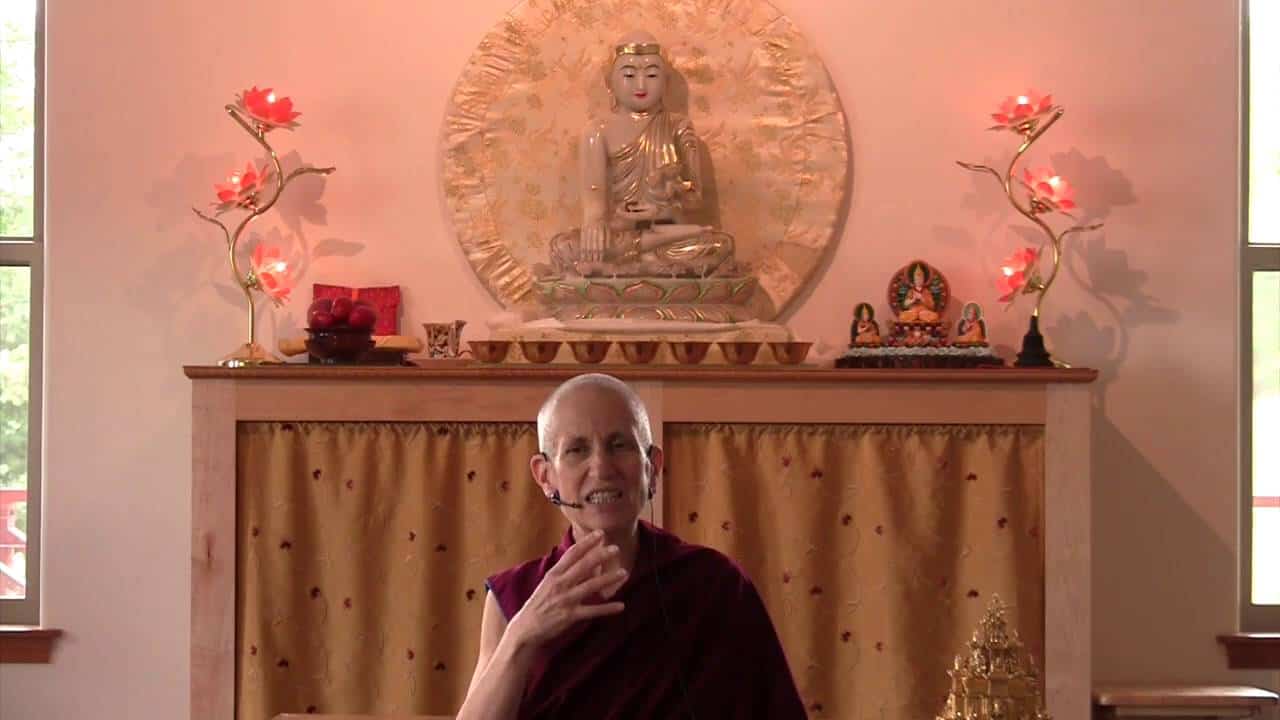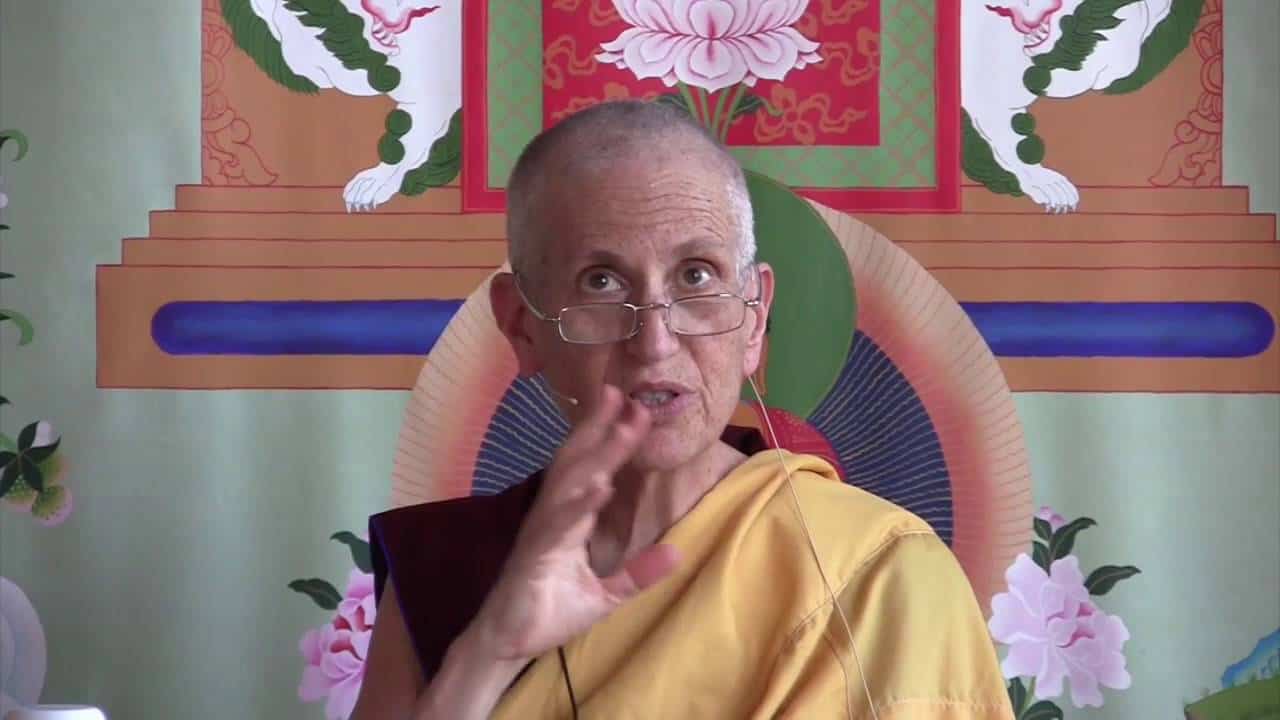Observing your own mind
Observing your own mind
Part of a series of teachings on a set of verses from the text Wisdom of the Kadam Masters.
- Emphasizing observing our own minds, not the behavior of others
- Increasing our ability to discern our motivations
- The danger in seeing others as only tools we can use
- Observing our minds influences the karma we create
Wisdom of the Kadam Masters: Observing your own mind (download)
We’ll be continuing with the text of very nice thought training slogans from the Kadampa tradition. We’re on the fourth one that says,
The best instruction is the constant observation of your mind.
Notice, it did not say, “The best observation is the constant observation of what other people are doing.” It did not say that. It said of our own mind. But what is it that we usually look at? What other people are doing. As a result we’re, most of the time, completely out of touch with what’s going on inside of us. Then as a result we’re very surprised when we wind up in a mess, when things don’t turn out as we had thought they would, when people we trusted betray that trust. I think so much of the problem–so many of the problems we have–is because we’re always looking at other people’s actions, and not paying attention to what’s going on inside of us. Because if we paid attention to what’s going on inside of us, we would be able to notice our superimpositions on other people: when we elaborate on their good qualities, or we elaborate on their bad qualities, making attachment and anger arise. We’d be able to notice even red flags. Sometimes we are observing somebody’s action and there’s a red flag. It’s like, “Hmm, why is this person saying or doing this?” But we want so much to have a certain kind of relationship with that person that we ignore the red flag. And because we’re not aware of what is going on in our own mind, we don’t realize that we did it until all of a sudden some time later the person isn’t acting the way we thought they were supposed to, according to our first assessment. And actually our first assessment, we might have noticed something but we just totally blocked it out because we didn’t really want to see things that way.
Had that happen? I’ve had that happen. Big mess afterwards.
If we pay attention to our own mind we’ll be able to really discern our motivation much better, and that will give us the ability to evaluate our actions without having to rely on other people to say if they liked or didn’t like what we did. But if we look at our own motivation we can tell if our motivation’s wholesome, if it’s unwholesome, and thus if the action was wholesome or unwholesome. If we’re out of touch with our own motivation, then whatever idea pops into our mind we usually just follow it, and then again wonder afterwards why things are so sticky and confused. It’s because we didn’t pay attention to “what am I doing?”
We’ve been talking a lot about agendas, having agendas. And helping people because we have an agenda. Or wanting things from other people because we have an agenda. Being nice to them because we have an agenda, what we want from them. And all of this happens, again, because we don’t observe our own mind. When we can observe our mind closely then we can see when we are objectifying people. And that objectification of people occurs in so many different ways. If that person knows somebody that we want to meet, then that person stops being a human being in our eyes and just becomes an object who can introduce us to who we want to meet. Or if that person has a special quality, or if that person’s wealthy, they cease to become a human being with feelings and they start to become only that quality, and we relate to them based on what we can get out of them.
There’s so much talk in the media now about objectifying women, but women aren’t the only ones who are objectified. And we do a lot of objectification ourselves. When we don’t observe our mind then all these ways of just seeing people in terms of, “what can they do that will benefit me?” That comes up. And that’s such a disgusting way to relate to other people. Don’t you think? When I see that in my mind I feel really disgusted. How can you respect yourself when you see other sentient beings only as tools to get you what you want? That’s what happens when we don’t observe our own mind. Whereas when we do observe our own mind we can see those things happening when they’re small, we can correct them. We can be so much more aware of how our mind helps to create our experience. How our mind creates our impression of the environment that we live in. Because it sure does. The attitude we bring to the table has a very direct effect on the experience we have from a certain situation. But without observing our minds we can’t see this.
Very important. Observe our own minds. This also influences a lot the karma that we create. And this observation of our own minds should really occur any time we have a Dharma teaching. When we hear some description of how afflictions operate, how karma operates, how good qualities arise, or whatever, we should start to observe our minds and see how those things work in our very own minds. Otherwise we say a lot of things, but we don’t really touch the Dharma. There’s no experience of the Dharma.
I can talk more about specific cases of this tomorrow.
Venerable Thubten Chodron
Venerable Chodron emphasizes the practical application of Buddha’s teachings in our daily lives and is especially skilled at explaining them in ways easily understood and practiced by Westerners. She is well known for her warm, humorous, and lucid teachings. She was ordained as a Buddhist nun in 1977 by Kyabje Ling Rinpoche in Dharamsala, India, and in 1986 she received bhikshuni (full) ordination in Taiwan. Read her full bio.


